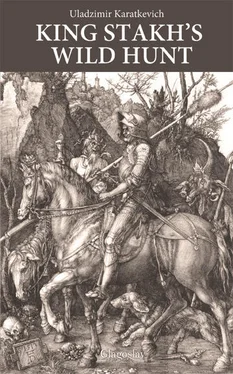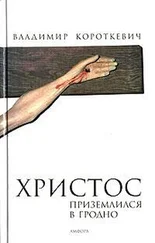This was the Byzantine Belarus!
This was the land of hunters and nomads, of the black tarsprayers, of the quiet and pleasant chimes coming across the quagmires from the distant churches, the land of lyric poets and of darkness.
It was just at this time that the long and painful decline of our gentry was coming to an end. This death, this being buried alive, continued over a long period, a period of almost two centuries.
And if in the 18th century the gentry died out stormily, in duels, in the straw, squandering millions, if at the beginning of the 19th the dying out bore a quiet sadness for the neglected castles in the pine groves, there was already nothing poetic or sorrowful about it in my days; it was at times rather loathsome, at times horrifying even in its nakedness.
It was the death of the sluggards who had hidden themselves in their burrows, the death of the beggars, whose forefathers had been mentioned as the most distinguished nobles in the Horodlo privilege; they lived in old, dilapidated castles, went about dressed mostly in homespun clothing, but their arrogance was boundless.
It was a running wild without any hope for better times: abominable, and at times, disgusting deeds, the reasons for which one could have sought only in their eyes set either too closely or too far apart, eyes of wild fanatics and degenerates.
Their stoves faced with Dutch tile they heated with splintered fragments of priceless Belarusian 17th century furniture; they sat like spiders in their cold rooms, staring into the endless darkness through windows along which small fleets of drops floated obliquely.
Such were the times when I was preparing for an expedition that would take me to the remote provincial District N. I had chosen a bad time for the expedition. It is summer, of course, that is a good time for the ethnographer: it is warm, all around there are attractive landscapes. However, our work gets the best results in the late autumn or in winter. This is the time for games and songs, for gatherings of women spinners with their endless stories, and somewhat later — the peasant weddings. This period is a golden time for us.
But I had managed to leave only at the beginning of August, not the time for story-telling. One could hear then only the drawn-out songs of harvest time resounding through the fields. All August I travelled about, and September, and part of October, and only just managed to catch the dead of autumn — the time when I might find something worthwhile. In the province they were awaiting things that could not be put off.
My catch was nothing to boast of, and therefore I was as angry as the priest who came to a funeral and suddenly saw the corpse risen from the dead. An old long-neglected fit of the blues tormented me, a feeling that in those days stirred in the soul of every Belarusian: it was his lack of belief in the value of his cause, his inability to do anything, his deep pain — the main signs of those evil years, signs that arose, according to the words of a Polish poet, as a result of the persisting fear that someone in a blue uniform would come up to you, and smiling sweetly, say: “To the gendarmery, please!”
I had very few ancient legends, although it was for them that I was on the hunt. You probably know that all legends can be divided into two groups. The first are those that are alive everywhere amidst the greater part of the people. In the Belarusian folklore they are legends about a queen, about an amber palace, and also a great number of religious legends.
And the second are those which are rooted, as if by chains, in some one locality, district, or even in a village. They are connected with an unusual rock or cliff at the bank of a lake, with the name of a tree or a grove or with a particular cave nearby. It goes without saying that such legends die out more quickly, although they are sometimes more poetic than the well-known ones, and when published they are very popular.
I don't know how it is with other ethnographers, but it has always been difficult for me to leave any locality. It would seem to me that during the winter that I had to spend in town, some woman might die there, the woman, you understand, who is the only one who knows that enchanting old tale. And this story will die together with her, and nobody will hear it, and my people and I shall be robbed.
Therefore my anger and my fit of the blues should not surprise anyone.
I was in this mood when one of my friends advised me to go to the District N., which was even at that time considered a most out-of-the-way place.
Did he have any idea that I would almost lose my mind because of the horrors facing me there, that I would find courage and fortitude in myself, and discover?... However, I shall not forestall events.
My preparations for leaving did not take me long: I packed the necessary things into a medium-sized travelling-bag, hired a carriage, and soon left the “capital city” of a comparatively civilized region to take leave of all civilization as I came to the neighbouring district with its forestry and swamps, a territory which was no smaller than perhaps Luxemburg.
At first, along both sides of the road were the fields, and among them were scattered here and there wild pear trees resembling oaks. We came across villages on our way in which whole colonies of storks lived, but then the fertile soil came to an end and endless forest land appeared. Trees stood like columns, the brushwood along the road deadened the rumbling of the wheels. The forest ravines gave off a smell of mould and decay; sometimes from under the very hoofs of the horses flocks of heath-cocks would rise up into the air (in autumn heathcocks always bunch together in flocks) and here and there from beneath the brushwood and heather brown or black caps of nice thick mushrooms were already peeping out.
Twice we spent the nights in small forest lodges, glad to see their feeble lights in the blind windows. Night-time. A baby is crying, something in the yard seems to be disturbing the horses — a bear is probably passing nearby, and over the tree-tops, over the ocean — like forest a solid rain of stars.
In the lodge it is impossible to breathe, a little girl is rocking the cradle with her foot. Her refrain is as old as the hills:
Don't go kitty on the bench,
You will get your paws kicked.
Don't go kitty on the floor,
You will get your tail kinked.
A-a-a!
Oh, how fearful, how eternal and immeasurable is thy sorrow, my Belarus!
Night-time. Stars. Primitive darkness in the forests.
And nevertheless even this was Italy in comparison with what we saw two days later.
The forest was beginning to wither, was less dense than before. And soon an endless plain came into view.
This was not an ordinary plain throughout which our rye rolls on in small rustling waves; it was not even a quagmire... a quagmire is not at all monotonous. You can find there some sad, warped saplings, a little lake may suddenly appear, whereas this was the gloomiest, the most hopeless of our landscapes: the peat-bogs. One has to be a misanthropist with the brain of a cave-man to imagine such places. Nevertheless, this was not the product of the imagination, here before our very eyes lay the swamp...
This boundless plain was brownish, hopelessly smooth, boring, gloomy.
At times we met great heaps of stones, at times it was a brown cone. Some god-forsaken man was digging peat, nobody knows why, — at times we came across a lonely little hut along the roadway, with its one window, with its chimney sticking out from the stove, with not a tree anywhere around. And the forest that dragged on beyond the plain seemed even gloomier than it really was. After a short while there began to appear little islands of trees even on this plain, trees overgrown with moss and covered with cobwebs, most of them as warped and ugly as those in the drawings that illustrate a horribly frightening tale.
Читать дальше



